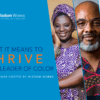
Futurist John C. Havens will be speaking about technology and wellbeing at Foresight & Trends 2014, FT#14.
I am a firm believer that the pursuit of wellbeing is driving innovations in technology—and tech innovations can drive wellbeing. Look at how the quantified-self movement has helped millions of us become more active and better understand what we consume to improve our physical health. So it was with great pleasure that I recently spoke with John C. Havens, founder of The H(app)athon Project, contributing writer to Mashable, The Guardian, and Slate, and author of Hacking Happiness, Why Your Personal Data Counts and How Tracking It Can Change the World. Only a moment into our conversation, I realized that John is not afraid to imagine a world gauged by wellbeing vs. wealth; one of his unique contributions to that world is to highlight the role of technology in creating wellbeing innovations that we could not conceive of before.
A Father’s Influence Shapes a Future
Given John’s self-described “geek-ness” for technology, I asked him where he got his fire for happiness and wellbeing. “I merged my passion for positive psychology with technology after my father passed away about three years ago,” John said. He’d already been in social media for nearly a decade and was familiar with digital technology and virtual reality in a way most of us can’t imagine, but it was his psychiatrist father’s legacy that really got him thinking. “I realized that the bulk of my father’s work was about sitting with people and letting them take a measure of their lives. And then helping them, or proving to them rather, that they could have a sense of worth. He spent over 50,000 hours with people. It really seemed very heroic to me,” John said. “And I thought, with all of the different technologies now becoming prevalent—they could provide a great way for people to measure their life, literally, and hopefully in a way that they don’t necessarily have to judge themselves too harshly or too often.”
Harnessing Data for Behavior Change
When I asked John for an example of these technologies helping us today, he spoke about the fast-growing quantified-self movement. “I find it fascinating, and I think a real gift, that people can get all these different points of data to really see how they can make changes in their lives and their behavior to increase their wellbeing.” He went on to say, “Emerging technologies will help us directly profit from the insights we gain from our quantified selves. Sensors in smartphones and wearable devices will help us track our emotions to improve our well-being based on the science of positive psychology.”
Yet he sees beyond simple self-monitoring to technology sharing that would allow you, your friends, or your co-workers to knowingly reinforce each other in choosing positive behaviors or dealing with challenges more effectively. For example, location-based technology could alert alcoholics who’ve asked for help when they’re near a bar that might trigger them, or send a message to their friends for support. “This would have to be a closed system, pre-approved by beforehand, so that people have chosen how they want to use the technology. That’s one way social technologies can be used to improve wellbeing.” And he says, “This would require vendors, like Facebook for example, to educate you on how reinforcing healthy behaviors can work through social media so that you feel really comfortable with it.”
The Double-Edged Sword of Data Gathering
John believes, however, that technology can be a double-edged sword. While it can help you become a more conscious and active participant in your own wellbeing, it can also have a dark side. Because corporations frequently harvest your data for its economic value, he cautions about the risks of losing control of your own information and identity. “What I know from my technology work is that so much of our personal data is owned or controlled by other people. This is of massive importance for people to understand.” Surveillance and data collection needs to be transparent, John believes, and just because oversight laws haven’t yet been created to monitor it doesn’t mean it’s legal or moral to monitor your data to understand your patterns of behaviors or collect your data without permission.
Pedometers are a good example, John says: “No one wants to measure every step they take. That’s why you have a pedometer. It’s an automation and a time-saver that makes sense. But you’re aware of the pedometer; you turn it on.” He doesn’t worry about these overt measurements that contribute to behavior change, just the more invasive covert data collection. “For the sake of wellbeing and happiness, I’m fighting for data transparency. People should be able to say, ‘This is my data. This is how I’d like it to be used in these different contexts— with brands, in my social networks, and so on’.”
Learn more about the power and pitfalls the role of technology plays in human wellbeing at johnchavens.com or hear John present about this topic live at Foresight & Trends 2014 (@future_trends, #FT14), an annual event that collects creative and innovative people from across the globe to discuss macro trends disrupting how business gets done. While you’re there, come by my workshop—Why 2020’s Strongest Brands & Companies Are Already Using Wellbeing As a Core Strategy— as well! If you’re planning to attend, save 20% with FT14RM.
READ MORE
• 4 Things Great Leaders Do (That The Rest Of Us Often Don’t) to Thrive
• Using Acknowledgment to Create a Culture of Wellbeing? Wellbeing Leader Judy Umlas Says It Only Takes 5 Cs
• The Big Questions of Living an Inspired Life (And 4 Big Answers!)
 Renee Moorefield, PhD
Renee Moorefield, PhD
A deep and early belief that the values of health and sustainability would remake the way we live, lead, and work in the 21st century led Renee to launch Wisdom Works with her husband David Moorefield in 1999. Ever since, she’s helped forward-thinking clients—including Apollo Group, Booz Allen Hamilton, Merck & Company, Centura Health, Western Union, and The Coca-Cola Company—embed wellbeing strategies to create inspired workplaces, develop caring relationships with citizens, and produce results that matter.





